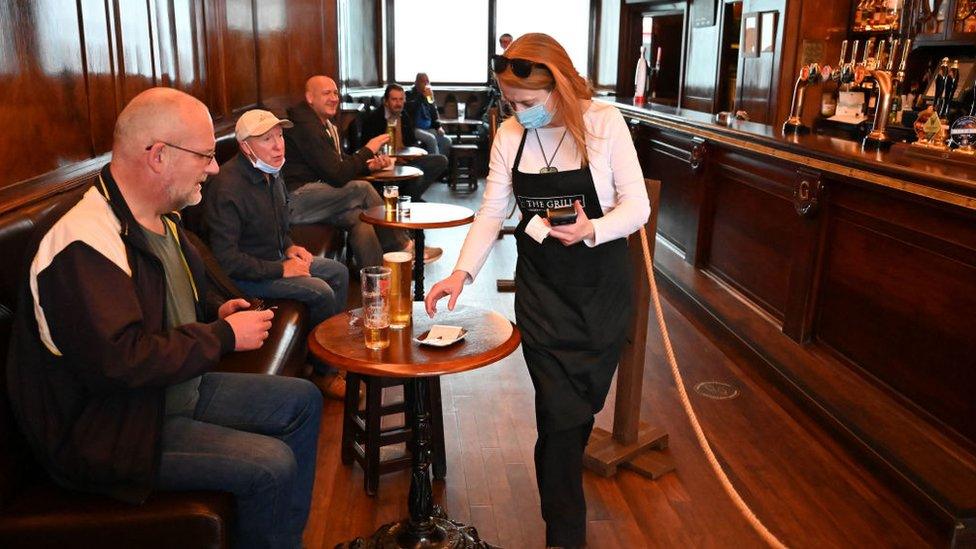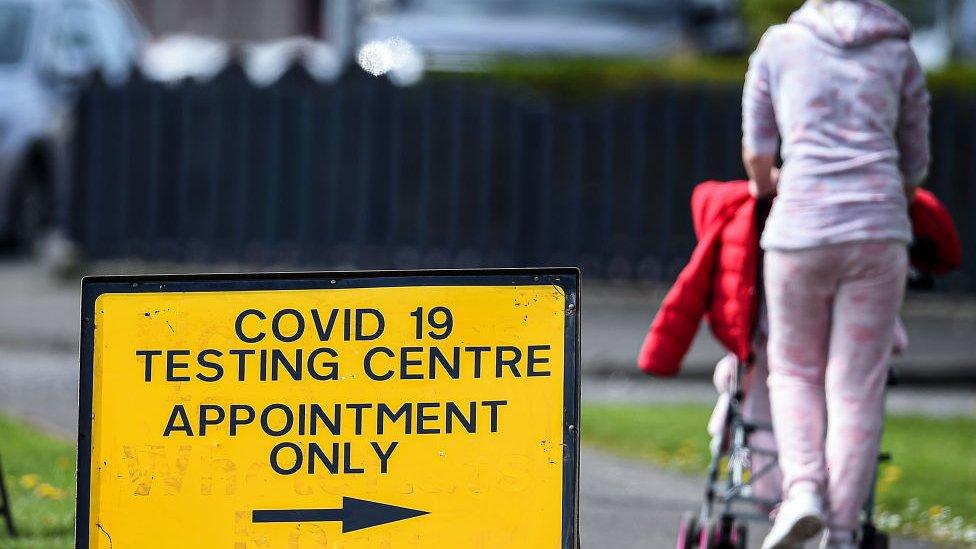Covid-19: Scotland to ease pub and restaurant restrictions
- Published
- comments

Pubs and restaurants in many areas of Scotland will be able to serve alcohol indoors again from next week, the first minister has announced.
Nicola Sturgeon said the move would allow licensed premises in level two of the country's new five-tier system to serve alcohol with a meal until 20:00.
In level three areas - likely to be much of the central belt - they can reopen until 18:00 but cannot serve alcohol.
The new rules will start on Monday.
The level that each of the 32 council areas in Scotland will fall under is expected to be confirmed on Thursday.
The new system will add two levels to the three-tier system currently in use in England, adding a "level zero" at the bottom - where life can return almost to normal - and strict measures similar to a full lockdown in level four.
It is expected that most of the central belt - which is currently under tighter restrictions than the rest of the country - will be placed in level three.
The exceptions could be North and South Lanarkshire, which could go into the highest level four category due to concerns about high numbers of cases and hospital admissions there.
In level four all pubs and restaurants would be closed, along with non-essential stores, visitor attractions, gyms, libraries and hairdressers.
However Ms Sturgeon said there had been "encouraging signs" in Lanarkshire, and that it would only be placed in the top tier "if absolutely necessary".
She also voiced concerns about the spread of the virus in Dundee, which could be moved into level three.
Much of the rest of the country is likely to go into level two - although rural areas including the Highlands, Orkney, Shetland, the Western Isles and Moray could be moved down to level one.
While level one could allow up to six people from two households to meet in homes again, Ms Sturgeon said this would not happen immediately as an "extra precaution" while the country transitions to the new system.
People will still be banned from meeting in other homes in levels two, three and four.
Ms Sturgeon said the new system would avoid the need for a "one size fits all" approach, and would allow areas with lower transmission of the virus to live under fewer restrictions than those with more cases.
The first minister said the government would be "deliberately cautious" when choosing levels, saying: "The situation is fragile and could go in the wrong direction, so we must take care."


The rules for hospitality businesses look set to be relaxed in all but level four areas, after changes to the strategy were agreed following consultations over the weekend.
They will be allowed to serve alcohol indoors in level two areas, as long as it accompanies a main meal.
Indoor areas will have to close at 20:00, but alcohol can continue to be served outdoors until 22:30.
Meanwhile in level three areas, premises will be allowed to open until 18:00 as long as no alcohol is sold.
People will have to sit at a table to eat or drink in all areas at all levels, and takeaways will still be allowed.
Ms Sturgeon said she hoped the changes would be welcome, adding that an advisory group has been set up to study whether venues should be allowed to reintroduce background music.
Bars and restaurants across Scotland's central belt had to close on 9 October as part of a "short, sharp action to arrest a worrying increase in infections", while tight restrictions were placed on those in the rest of the country.
New cases 'slowing'
A further 1,327 cases of coronavirus were registered in Scotland on Tuesday, alongside 25 deaths of people who had tested positive in the previous 28 days.
The number of people in hospital rose to 1,100, which Ms Sturgeon said was now just 400 short of the peak during the first wave of the virus in April.
However the first minister said it was thought that the current restrictions were "having an effect" and were "slowing" the increase in new cases.
She said: "If we dig in now and get Covid under more control, we perhaps open the door not to 100% normality by Christmas, but hopefully to more than we have now."

Ms Sturgeon announced the changes at the beginning of a Holyrood debate, ahead of MSPs discussing whether to back the general principles of the new system.
On Tuesday evening, MSPs agreed to back the Scottish government's strategic framework for tackling the virus.
Scottish Conservative group leader Ruth Davidson welcomed many of the measures, but called for a business advisory council to be involved in making decisions and shaping restrictions to "help keep Scottish jobs safe".
Labour leader Richard Leonard said the framework did not have his party's "unquestioning support", calling for "persuasive evidence" to be published and for MSPs to be given more opportunities to scrutinise the government's strategy.
This led Ms Sturgeon to reply that she had "probably answered more questions than any leader of any government anywhere in the world".
Scottish Green MSP Alison Johnstone said "we cannot continue to lurch from one lockdown to another until an effective vaccine becomes available", saying the goal must be to eliminate the virus rather than suppress it.
And Lib Dem leader Willie Rennie said the government had "missed the opportunity" to prepare for the second wave with greater testing and tracing systems while the virus was at a lower level over the summer.
But Health Secretary Jeane Freeman hit back by saying that "it is entirely wrong to say that we were complacent or foolish in what we said and did over the summer months".

